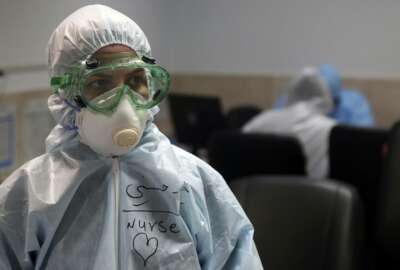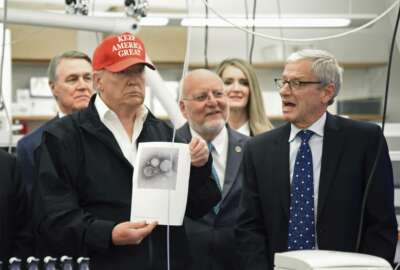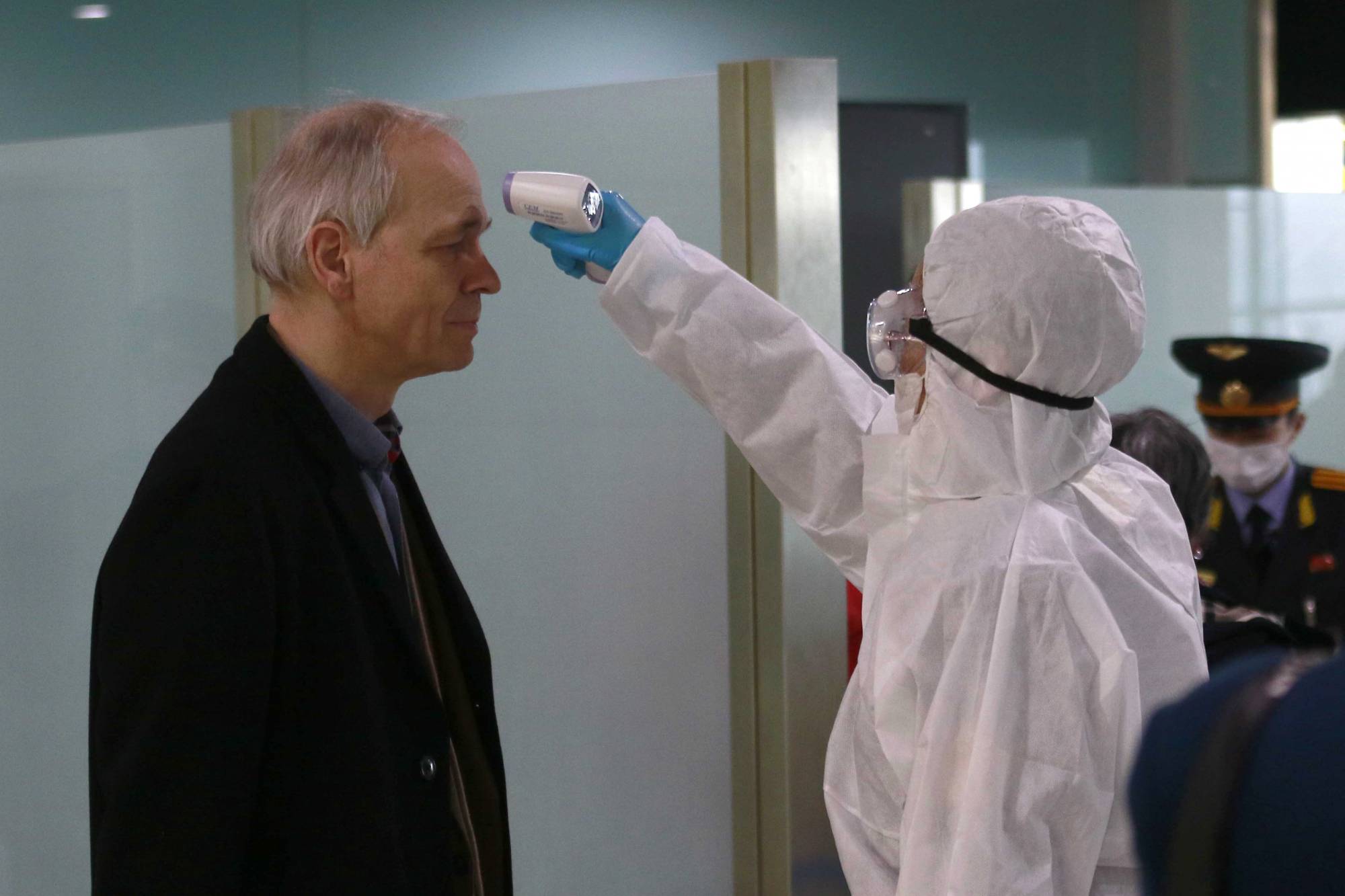
Congress pressing agencies for coronavirus information
After President Trump signed the emergency corona virus appropriations bill Friday, the National Institutes of Health, Centers for Disease Control and Prevention...
Best listening experience is on Chrome, Firefox or Safari. Subscribe to Federal Drive’s daily audio interviews on Apple Podcasts or PodcastOne.
After President Trump signed the emergency corona virus appropriations bill on Friday, the National Institutes of Health, Centers for Disease Control and Prevention and others are it. This week we’ll learn more about federal plans as hearings continue. Federal Drive with Tom Temin got the latest from WTOP Capitol Hill correspondent Mitchell Miller.
Interview transcript:
Tom Temin: Mitchell, what can we expect in the week ahead now?
Mitchell Miller: Well, one of the biggest things that will expect to hear from is the director of the CDC Dr. Robert Redfield. He’s set to testify this week before a House Appropriations Subcommittee, and like others before him, he’s going to get peppered with questions about the response to the coronavirus. Now among the issues he’s likely to get questioned about is the CDC’s initial distribution of faulty diagnostic test kits and what’s been done to approve those tests and get them out to people. As you know, there have been a lot of questions about these tests. Whether or not people are going to get them in time, whether or not they can move forward quickly enough to get all of these people now across the country as the coronavirus keeps spreading, so we’ll look for a lot of questions related to that. This will follow up on questions that Health and Human Services Secretary Alex Azar has been getting from a lot of lawmakers. As you know, during recent hearings, he got a lot of questions about the future of a vaccine, about what the costs of it might be about basically the response of the Trump administration and how it’s doing. So I think we’re going to see a lot more questioning in that vein in the coming week.
Tom Temin: And what about air travel and gatherings and federal
buildings and so forth, that hasn’t really bubbled up quite as high yet, has it?Mitchell Miller: Not yet, but certainly it’s going to. I mean, think about it, a lot of people are already thinking about the fact that spring break is coming up. A lot of families considering whether or not they’re going to continue with their flying plans., if they had some already. They’ve been getting a lot of questions about this, lawmakers on Capitol Hill have. There was a hearing this past week related to air travel, and it really sparked a nerve with a lot of lawmakers it looked like. Congress, looking at the Commerce Aviation subcommittee, there were a lot of questions about air travel. Already, many of the airlines, as you know, have been cutting back on their routes and saying that some of their planes that are usually packed or not even full now. And during this hearing this past week, administration officials were pressed on what they’re doing to make sure the airlines and the airports pass on timely and useful information to the flying public. And basically, a lot of lawmakers say they don’t think that the administration is doing enough in that regard. Washington state Senator Maria Cantwell is among those who have been critical, and she, of course, her state Washington state, is at the center of the deadliest outbreak of the coronavirus. She seemed surprised when officials couldn’t tell her what the guidelines are for decontaminating planes. So I think we’re going to get a lot more of these questions being raised as we move into more of a heavy travel season
Tom Temin: So we might see Secretary Elaine Chao handing out purell bottles in the airport?
Mitchell Miller: Very well could be. And you know, you’ve heard about the spike in the costs of these purell bottles. They’ve been going high on online for as much as 40 to 50 dollars reportedly. But she was also testifying at this recent hearing, and she’s going to get a lot more questions about this. Republicans and Democrats both very concerned about the flying public and what’s going to happen here.
Tom Temin: It might be cheaper for the airlines to hand out nips for people to rub their hands if they can’t afford a purell. All right, so we’re going to see a lot of agency and congressional interaction in the week ahead, basically sounds like?
Mitchell Miller: Right, and they’re, of course, will be a lot of follow up on this big package. $8.3 billion to go towards fighting the coronavirus. It has so many different aspects of it that you’re going to probably see a lot of follow up on where the money is actually going, how it’s being distributed. Of course, it’s very early in the pipeline now, but just a few highlights are that the fact that close to $3 billion will be going toward research and development on the vaccines. So of course, there’s been a lot of attention related vaccine. Some have been critical of President Trump, saying he got ahead of the game and said that it was actually going to be developed, maybe in a matter of months. Dr. Anthony Fauci from National Institutes of Health pushed back a little bit on that and said, wait a second, we’re going to probably get one in about a year to a year and a half even though it is moving as fast as possible now related to that. There was a news conference this past week in connection with several lawmakers who are concerned about the price of the new vaccine. Once it is developed, they are worried that it’s not going to be affordable. Maryland Senator Chris Van Hollen among those raising concerns that says, basically saying that we can’t have price gouging and worry about whether or not people can actually get this vaccine once it’s allowed to go to the public. The administration has since kind of hedged its bets a little bit, and and later Secretary Azar did say that they would probably help out with making the vaccine more affordable. But that’s just one of the questions that that’s another one being raised by lawmakers.
Tom Temin: And this whole coronavirus issue has blended over into another kind of low level but nagging issue for the federal government. And that is to the extent that federal employees are allowed to telework. This is something the administration has been cutting back on. But looks like Congressman Gerry Connolly from Northern Virginia is looking to push agencies back into teleworking. And using the coronavirus is a good reason to do so.
Mitchell Miller: Right. I mean, some lawmakers, as you know, are concerned about backsliding on telework, and they’re they’re concerned about that during years when there’s not any major health crisis or other emergency. So this could be really important in the coming weeks. Representative Connolly, as you mentioned, others Maryland Congressman John Sarbanes, Virginia Congresswoman Jennifer Weston. They are also joining him with this legislation, which would basically encourage federal agencies to do more to get people to telework, and also not to cut the programs in place. As Federal news Network has been reporting, some of the agencies now have been cutting back because of plans that were already in the pipeline. Places like Departments of Agriculture, even within the Department of Health and Human Services itself. There has been a reduction of telework, so you can look for Congressman Connolly to keep pushing on that. Similar legislation that was proposed a couple of years ago did not pass, but that was when the House was in Republican control. Of course, Democrats are now a little bit more optimistic that they may make some progress on this.
Tom Temin: And the other set of employees that’s kind of on the front lines here is those of the TSA, and they’ve got a big contract negotiation battle going on. They’ve also got bills in Congress that would put them in Title Five.
Mitchell Miller: Right. The House recently passed this past week to give TSA workers the rights and protections that basically most federal workers already have. Under that Title Five of the U. S. Code, they would get collective bargaining rights, due process, whistle blower protections. Among the things that many other federal employees, of course, get now. That legislation is co sponsored by two pretty heavy hitters in the House. Mississippi Congressman Bennie Thompson, the chair of the House Homeland Security Committee, and Nita Lowey, who’s the chair of the House Appropriations Committee. So they’re hoping to push forward on that. Now there is opposition to it. Some Republicans have pointed out that it would limit the flexibility, in their view of the TSA, to deal with just the kind of emergency that we’re dealing with. So there’s going to be some back and forth on this as they try to sort out what the TSA can actually do during a major health crisis like this.
Tom Temin: I guess if you look at it across the board, the coronavirus has become kind of a crucible for so many policies that Congress and the administration are at loggerheads over.
Mitchel Miller: It really is. I mean, this is interesting Tom because we just came out of everything related to impeachment. And of course, impeachment had the cloud over all of these issues as you looked at hearings and talked to lawmakers, and now a very similar obviously a different dynamic because we’re dealing with a health issue. But similarly it is basically crowding out a lot of the typical things that Congress is doing. And of course, A lot of people on both sides of the aisle want to make sure that they get the public the information they need. They want to make sure that they hold the administration and agencies accountable. So we’re going to see this I think dominating government operations for quite a while.
Tom Temin: And no bills in sight to make the stock market go back up, huh?
Mitchel Miller: No, not right now. Everybody would like that magic bullet, but for now, it doesn’t look like that’s happening.
Tom Temin: Thanks so much for joining me.
Mitchell Miller: You bet.
Copyright © 2025 Federal News Network. All rights reserved. This website is not intended for users located within the European Economic Area.




